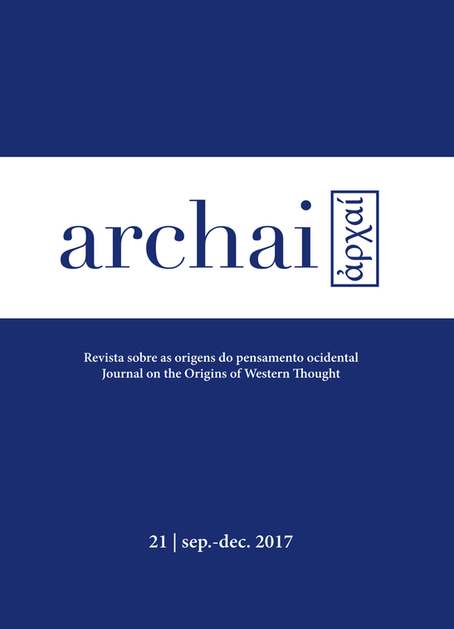La filosofia virtuale di Parmenide, Zenone e Melisso Uno sguardo alle prossime Lezioni Eleatiche The Virtual Philosophy of Parmenides, Zeno, and Melissus A Glance to the Upcoming Eleatic Lectures
DOI:
https://doi.org/10.14195/1984-249X_21_10Keywords:
Parmenide, Zenone, Melisso, Platone, Gorgia, Filosofia, OntologiaAbstract
Perché ‘filosofia virtuale’? Perché con ogni verosimiglianza né Parmenide né Zenone o Melisso ebbero la più vaga idea di ciò che in epoche successive cominciò ad essere chiamato ‘filosofia’, e perciò non ebbero nemmeno la possibilità di delineare una loro filosofia. Così essi possono essere stati, al massimo, dei filosofi inconsapevoli e involontari, dunque meramente virtuali.
Inoltre c’è abbondanza di indizi per pensare che, una volta stabilite le fondamenta della sua dottrina dell’essere, Parmenide omise di sviluppare una compiuta teoria basata su di esse, mentre fu capace di offrire una serie di dottrine su cielo, terra e organismi viventi. Ora, se così stanno le cose, in cosa dovrebbe consistere la sua filosofia virtuale? Nemmeno Zenone pervenne a delineare una sua filosofia virtuale, mentre Melisso sì.
Downloads
References
BLACK, M. (1950-51). Achilles and the Tortoise. Analysis 11, p.91-101. https://doi.org/10.1093/analys/11.5.91
BARNES, J. et al. (2011). Zenone e l’infinito. Sankt Augustin, Academia Verlag.
BRISSON, L.-MACÉ; A.-THERME, A.-L., eds. (2012). Lire les Présocratiques. Paris, Presses Universitaires de France. https://doi.org/10.1093/analys/11.5.91
CAVEING, M. (1982). Zénon d’Elée. Prolégomènes aux doctrines du continu. Paris, Librairie Philosophique J. Vrin.
COLLI, G. (1998). Zenone di Elea, Lezioni 1964-1965. Milano, Adelphi.
DOWDEN, B. Zeno’s Paradoxes. Internet Encyclopedia of Philosophy. (www.iep.utm.edu/zeno-par)
CORDERO, N.-L., ed. (2011). Parmenides Venerable and Awesome. Las Vegas, Parmenides Publishing.
COXON, A. H. (2009). The Fragments of Parmenides. Assen, Van Gorcum, 1986. Revised and Expanded Edition by R. McKirahan. Las Vegas, Parmenides Publishing.
DILLON, J. (1974). New Evidence on Zeno of Elea? Archiv für Geschichte der Philosophie 56, p.127-131. https://doi.org/10.1515/agph-1974-0201
FANO, V. (2012). I paradossi di Zenone. Roma, Carocci Editore.
FLASHAR, H.-BREMER, D.-RECHENAUER, G. eds. (2013). Frühgriechische Philosophie I-II (Die Philosophie der Antike 1). Basel, Schwabe Verlag.
GLAZEBROOK, T. (2001). Zeno against Mathematical Physics. Journal of the History of Ideas, 62, p. 193-210. https://doi.org/10.1353/jhi.2001.0014
HARRISON, C. (1996). The Three Arrows of Zeno: Cantorian and Non-Cantorian Concepts of the Continuum and of Motion. Synthese 107, p. 271-292. https://doi.org/10.1007/BF00413609
HOPKINS, P. (2006). Zeno’s Boêtheia Tôi Logôi: Thought Problems about Problems for Thought. Epoché 11, 1-25. https://doi.org/10.5840/epoche200611126
HUGGETT, N. (2009). Space from Zeno to Einstein.Cambridge MS, The MIT Press.
LAKS, A.-MOST, G.W. (2016). Early Greek Philosophy. Cambridge MS-London, Harvard University Press.
LAKS, A.-MOST, G.W. (2016). Les débuts de la Philosophie, des premiers penseurs grecs à Socrate. Paris, Fayard.
LEE, H. D. P. (1965). Zeno of Elea. Cambridge 1936. Reprint Amsterdam, Hakkert.
MANSFELD, J. et al. (2016). Melissus Between Miletus and Elea. Sankt Augustin, Academia Verlag.
MARCACCI, F. (2016). Sulla logica dimostrativa di Melisso. In MANSFELD, J. Melissus, p.145-149.
PALMER, J. (2004). Melissus and Parmenides. Oxford Studies in Ancient Philosophy 26, p.19-54.
PIERGIACOMI, E. (2014). Stronger Reality. The Epistemological and Theological Innovations of Melissus to Parmenides’ Philosophy. Philologus 158, p.197-215. https://doi.org/10.1515/phil-2014-0014
ROSSETTI, L. (2010a). Zenone di Elea, maestro in comunicazione. In CORTÉS GABAUDAN. F.- MÉNDEZ DOSUNA, J. V., eds. Dic mihi musa virum. Homenaje al Profesor Antonio López Eire. Salamanca, Universidad de Salamanca, p.595-602.
ROSSETTI, L. (2010b). La structure du poème de Parménide. Philosophie Antique 10, p.187-226.
ROSSETTI, L. (2013, fumetto con disegni di A. Mannino). Una tartaruga irraggiungibile. Bologna, Diogene Multimedia.
ROSSETTI, L. (2015a). La filosofia non nasce con Talete, e nemmeno con Socrate. Bologna, Diogene Multimedia.
ROSSETTI, L. (2015b). La polumathia di Parmenide. Chora 13, p.193-216. https://doi.org/10.5840/chora20151342
ROSSETTI, L. (2016). Tertium datur. I molti bei modi del philosophein. Logoi 2, 112-118.
ROSSETTI, L. (2017a). Un altro Parmenide. Bologna, Diogene Multimedia.
ROSSETTI, L. (2017b). L’impresa di Zenone, monumento alla creatività . Hypnos (forthcoming).
Å ESTOV, L. (1938). Athènes et Jérusalem. Paris, Librairie Philosophique J. Vrin.
WISDOM, J.O. (1941). Why Achilles does not Fail to Catch the Tortue. Mind 50, p.58-73. https://doi.org/10.1093/mind/L.197.58
Downloads
Published
How to Cite
Issue
Section
License
Given the public access policy of the journal, the use of the published texts is free, with the obligation of recognizing the original authorship and the first publication in this journal. The authors of the published contributions are entirely and exclusively responsible for their contents.
1. The authors authorize the publication of the article in this journal.
2. The authors guarantee that the contribution is original, and take full responsibility for its content in case of impugnation by third parties.
3. The authors guarantee that the contribution is not under evaluation in another journal.
4. The authors keep the copyright and convey to the journal the right of first publication, the work being licensed under a Creative Commons Attribution License-BY.
5. The authors are allowed and stimulated to publicize and distribute their work on-line after the publication in the journal.
6. The authors of the approved works authorize the journal to distribute their content, after publication, for reproduction in content indexes, virtual libraries and similars.
7. The editors reserve the right to make adjustments to the text and to adequate the article to the editorial rules of the journal.



